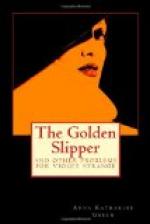Had he wished, he could not have forborne that look. Had his eyes been closing in death, or so he felt, the trembling lids would have burst apart at this call and the revelations it promised.
And what did he see? What did that window hold for him?
Nothing that he might not have seen there any night at this hour. His father’s figure drawn up behind the panes in wistful contemplation of the night. No visible change in his attitude, nothing forced or unusual in his manner. Even the hand, lifted to pull down the shade, moves with its familiar hesitation. In a moment more that shade will be down and— But no! the lifted hand falls back; the easy attitude becomes strained, fixed. He is staring now—not merely gazing out upon the wastes of sky and sea; and Roger, following the direction of his glance, stares also in breathless emotion at what those distances, but now so impenetrable, are giving to the eye.
A spectre floating in the air above the promontory! The spectre of a woman—of his wife, clad, as she had been clad that fatal night! Outlined in supernatural light, it faces them with lifted arms showing the ends of rope dangling from either wrist. A sight awful to any eye, but to the man of guilty heart—
Ah! it comes—the cry for which the agonized son had been listening! An old man’s shriek, hoarse with the remorse of sleepless nights and days of unimaginable regret and foreboding! It cuts the night. It cuts its way into his heart. He feels his senses failing him, yet he must glance once more at the window and see with his last conscious look— But what is this! a change has taken place in the picture and he beholds, not the distorted form of his father sinking back in shame and terror before this visible image of his secret sin, but that of another weak, old man falling to the floor behind his back! Abram! the attentive, seemingly harmless, guardian of the household! Abram! who had never spoken a word or given a look in any way suggestive of his having played any other part in the hideous drama of their lives than that of the humble and sympathetic servant!
The shock was too great, the relief too absolute for credence. He, the listener at the grotto? He, the avenger of the family’s honour? He, the insurer of little Roger’s continuance with the family at a cost the one who loved him best would rather have died himself than pay? Yes! there is no misdoubting this old servitor’s attitude of abject appeal, or the meaning of Homer Upjohn’s joyfully uplifted countenance and outspreading arms. The servant begs for mercy from man, and the master is giving thanks to Heaven. Why giving thanks? Has he been the prey of cankering doubts also? Has the father dreaded to discover that in the son which the son has dreaded to discover in the father?
It might easily be; and as Roger recognizes this truth and the full tragedy of their mutual lives, he drops to his knees amid the honeysuckles.




